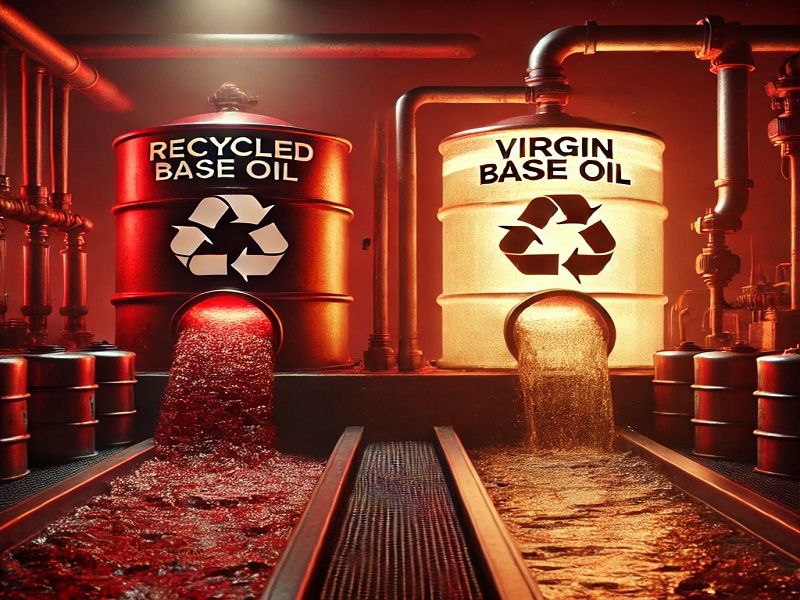Table of Contents
ToggleRecycled vs. Virgin Base Oil:
Types, Applications, and Benefits
Introduction
Base oil is a crucial component in lubricants, greases, and industrial oils. It is categorized into two types: virgin base oil (directly refined from crude oil) and recycled base oil (processed from used oil). Understanding their differences, types, applications, and advantages helps industries make informed choices for cost-effectiveness and sustainability.
What is Base Oil?
Base oil is the primary ingredient in lubricants, constituting 70-90% of the final product. It provides essential properties such as viscosity, oxidation stability, and thermal resistance.
Base oils are derived from refining crude oil or recycling used oil through advanced purification processes.
Types of Base Oil
Base oils are classified into five groups based on sulfur content, viscosity index, and level of refining:
Virgin Base Oil (Refined from Crude Oil)
- Group I – Solvent-refined, low viscosity index, contains sulfur
- Applications: Industrial oils, hydraulic fluids, greases
- Group II – Hydrotreated, higher purity, better oxidation stability
- Applications: Motor oils, marine lubricants, automotive fluids
- Group III – Severely hydrocracked, high viscosity index, synthetic-like properties
- Applications: High-performance lubricants, synthetic blends
- Group IV – Polyalphaolefin (PAO), fully synthetic
- Applications: Extreme-temperature applications, aerospace lubricants
- Group V – Other synthetic base oils (esters, silicones, PAGs)
- Applications: Specialized industrial and aviation lubricants
Recycled Base Oil (Processed from Used Oil)
Recycled base oil undergoes filtration, vacuum distillation, hydro-treatment, and additive enrichment to restore its properties.
Types of Recycled Base Oil
- Re-refined Base Oil (RRBO)
- Highly purified through advanced processes
- Comparable to Group I & II virgin base oils
- Processed Used Oil
- Less refined, used for lower-grade lubricants and fuel additives
- Blended Recycled Oils
- Mix of virgin and recycled oils for better performance and cost efficiency
Comparison: Recycled vs. Virgin Base Oil
| Feature | Virgin Base Oil | Recycled Base Oil |
|---|---|---|
| Source | Crude oil refining | Used oil recycling |
| Purity | Higher (especially Group II & III) | Depends on refining method |
| Cost | More expensive | Cost-effective |
| Environmental Impact | High (due to crude oil extraction) | Low (reduces waste and emissions) |
| Performance | High in premium grades | Comparable in re-refined oils |
| Applications | Automotive, industrial, aviation | Automotive, industrial, secondary lubrication |
Applications of Base Oil
1. Automotive Lubricants
- Engine oils, transmission fluids, and gear oils
- Both virgin and recycled oils meet industry standards
2. Industrial Lubricants
- Used in hydraulic systems, compressors, turbines, and bearings
- Recycled base oils are cost-effective for heavy industries
3. Metalworking Fluids
- Lubricants for machining, cutting, and grinding
- Virgin oils are preferred for high-performance needs
4. Greases and Transformer Oils
- Base oils are core components of greases and dielectric fluids
- Recycled oils are suitable for industrial greases
5. Marine and Aviation Lubricants
- Requires high-viscosity and oxidation-resistant oils
- Mostly Group II-IV virgin base oils
Advantages of Recycled Base Oil
- Eco-friendly (reduces waste oil pollution)
- Cost-effective compared to virgin oil
- Comparable performance to virgin Group I & II oils
- Reduces crude oil dependency
Advantages of Virgin Base Oil
- Higher purity and stability
- Better oxidation resistance in premium grades
- Suitable for high-performance applications
- Longer lifespan in extreme conditions
Both recycled and virgin base oils play a vital role in lubricant production. While virgin base oils provide premium performance, recycled base oils offer cost savings and environmental benefits. Industries are increasingly adopting recycled base oils for sustainability, making them a viable alternative in many applications.
